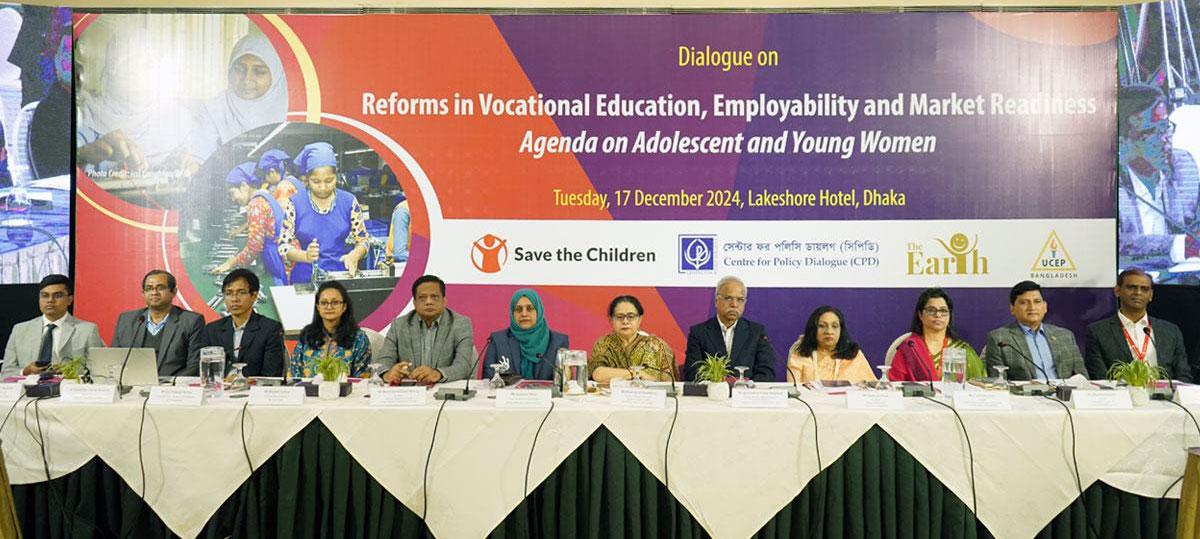
A recent study on the vocational education and employability of adolescent girls and young women in Kishoreganj has highlighted significant challenges and opportunities. Despite a strong willingness to learn and work, young women face barriers such as limited access to high-demand technical training, socio-cultural norms, and skill mismatches with the job market.

Employment remains concentrated in agriculture and informal work, with insufficient access to industrial and service sector roles. To address these issues, the study recommends a number of trades for skilling girls in different upazilas within Kishoregonj district. Moreover, this study also recommended to introduce digital literacy and Science, Technology, Engineering, and Mathematics (STEM) training to equip young women for emerging opportunities.
The study, jointly conducted by the Centre for Policy Dialogue (CPD) as a consortium partner. Save the Children in Bangladesh is leading the consortium and, The Earth and Underprivileged Children’s Educational Programs (UCEP Bangladesh) are also taking part in this consortium for implementing a project titled POWER. This study used a combination of qualitative and quantitative methods to assess labour market conditions and skill gaps.
It identified socio-cultural norms, mobility restrictions, and early marriage as major barriers preventing many young women from pursuing education, training, and employment. The research also pointed to a lack of market-oriented training programmes, particularly in sectors such as freelancing, healthcare, and IT, which could offer more sustainable economic opportunities.
The findings were presented during a dialogue titled ‘Reforms in Vocational Education, Employability and Market Readiness: Agenda on Adolescent and Young Women’ held on Tuesday, 17 December 2024. Dr Khondaker Golam Moazzem, Research Director at CPD, and Mr A S M Shamim Alam Shibly, Senior Research Associate at CPD, delivered the keynote presentation.
Among the recommendations were the development of skill courses tailored to regional economic needs, the creation of apprenticeship programmes in collaboration with local industries, and expanded training in digital marketing and freelancing to enable remote work. Improving soft skills like leadership and conflict resolution was also emphasised to prepare young women for professional roles.
The Chief Guest, Ms Nasreen Afroz, Executive Chairman (Secretary), National Skills Development Authority (NSDA), highlighted ‘Without a holistic approach, a skills ecosystem cannot be created. Everyone needs to be included, and their skill demands must be met’, she stated. She added that the NSDA has already taken initiatives to develop skills based on the unique strengths and specialties of each district’.
Mr Syed Sultan Uddin Ahmmed, Chairman, Workers’ Rights Commission, Executive Director,Bangladesh Institute of Labour Studies (BILS), attended the dialogue as a Special Guest and underscored ‘When training is provided to 13 to 16-year-olds, it should address skill gaps and ensure job placement, with a clear pathway to employment’.
While chairing the session, Ms Rasheda K Choudhury, Member, CPD Board of Trustees, Executive Director, CAMPE and Former Advisor to the Caretaker Government, said ‘Socio-cultural barriers and a lack of diverse skill development continue to hinder young women’s full participation, particularly in rural areas such as Kishoreganj’.
In her introductory remarks, Ms Tania Sharmin, Director, Food Security & Livelihoods/Child Poverty, Save the Children in Bangladesh, discussed about the POWER project and said ‘The project primarily aims to identify the challenges and gaps that are causing women to fall behind and to determine the necessary steps to address these issues effectively’.
‘We need to work on changing mindsets, as ideas about the kind of jobs girls should pursue are shaped early on’, said Ms Shakila Sattar, Vice-Chairman and Founder of The Earth Society. She added that with skill-based education increasingly replacing traditional education, aligning it with job placement is crucial.
Mr Joy Prakash Barua, Deputy Director – Program and Innovation, UCEP Bangladesh, emphasised the importance of addressing the need for equipment in skills training. He pointed out that it is challenging to send expert trainers to remote areas like Kishoreganj, making online training the most viable option. However, for this to be effective, trainees must have access to laptops—something that most projects fail to consider.
Mr Khaliluz Zaman, Director, Kishoreganj Chamber of Commerce & Industry (KCCI) and NASCIB, suggested ‘If parents are made aware that education and training can secure a better future for their 9-year-old daughters, and the consequences of child marriage are explained to them, they may reconsider marrying their daughters off at such a young age’.
The President of Women Entrepreneurs’ Association of Bangladesh, Ms Sheezan Khan, opined ‘If young and adolescent girls are aware from an early age of the careers they want to pursue in the future, they will be better equipped to progress, leading to the creation of more entrepreneurs and contributing to overall socioeconomic development’.
While discussing the topic of skills development and entrepreneurship, Mr Mirza Nurul Ghani Shovon, President, National Association of Small & Cottage Industries of Bangladesh (NASCIB), stated that skills training alone is not enough unless space is provided to foster entrepreneurship. He emphasised that training must be sector-specific, planned early on, and go beyond traditional areas like sewing.
Mr Kabir Ahmed, Project Director – GESP, Save the Children in Bangladesh provided an overview of the project and its objectives. He stated, ‘The project aims to reach 15,550 girls aged 13 to 16 with targeted interventions, while also providing skill training to 10,600 young women aged 17 to 25 to enhance their employability and future opportunities’.
In her summary of the discussion, Ms Tania Sharmin highlighted a significant point—the need for strong coordination not only among government institutions but also with private institutions. She also added ‘Working with women alone is insufficient without addressing domestic violence and societal issues at the community and family levels. Changes in these areas are essential for real progress’.
The dialogue was attended by high-level policymakers, government officials, academics, development practitioners, civil society members, international development partners, and journalists. The event underscored the urgency of aligning training programmes with market needs to ensure young women can overcome barriers and thrive in a changing economic landscape.


